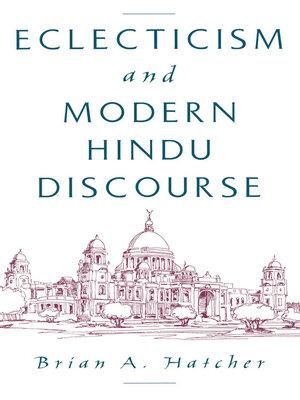
Sign up to save your library
With an OverDrive account, you can save your favorite libraries for at-a-glance information about availability. Find out more about OverDrive accounts.
Find this title in Libby, the library reading app by OverDrive.



Search for a digital library with this title
Title found at these libraries:
| Loading... |
In this new book, Brian Hatcher examines the modern Hindu penchant for constructing religious worlds in an eclectic fashion. Noting how Hindu apologists from Rammohun Roy to Sarvepalli Radhakrishnan make an almost promiscuous use of the world's many philosophies and religions to define and defend Hinduism, Hatcher sets out to explore the ancient roots and contemporary significance of such eclectic borrowing. A discussion of the Vedic and classical roots of Hindu eclecticism affords Hatcher the opportunity to reflect upon the profound and widespread role of eclecticism in South Asian religion, while consideration of the work of Swami Vivekananda—as well as a variety of religious reformers from nineteenth-century Bengal—suggests the ongoing significance of the phenomenon in colonial and postcolonial contexts. By examining the development of Brahmo and Neo-Vedanta discourse, Hatcher is able both to problematize the notion of a monolithic concept of religious eclecticism and to reflect upon the various ways scholars might nevertheless attempt to make sense of a bewildering variety of eclectic philosophies. What emerges is not simply an attempt to refine our understanding of the role eclecticism has played in the modern Hindu context, but an extended reflection upon changing attitudes toward eclecticism in the West, from Diderot and Kant through postmodern critical theory. By investigating modern and postmodern perspectives on such issues as history, system, authenticity, and difference, Hatcher seeks to set in motion a dialectical approach to the study of eclectic world construction that balances the positivisitic confidence of modern scholarship with the playful exuberance of postmodern pastiche. Invoking the critical theories of Salman Rushdie, Theodor Adorno, and Richard Rorty, Hatcher advocates an approach to modern Hindu eclecticism that honors its creative poetics while retaining the critical distance necessary for judging its sometimes baleful fruits.






